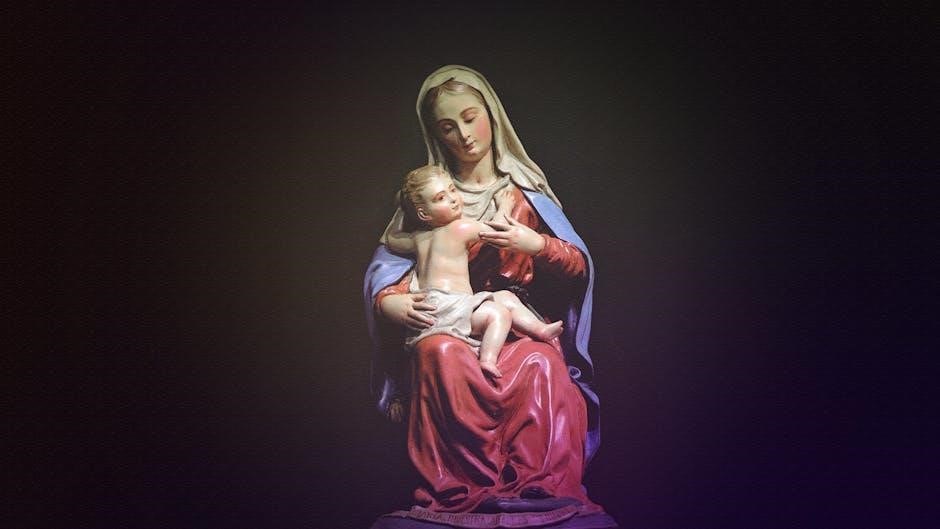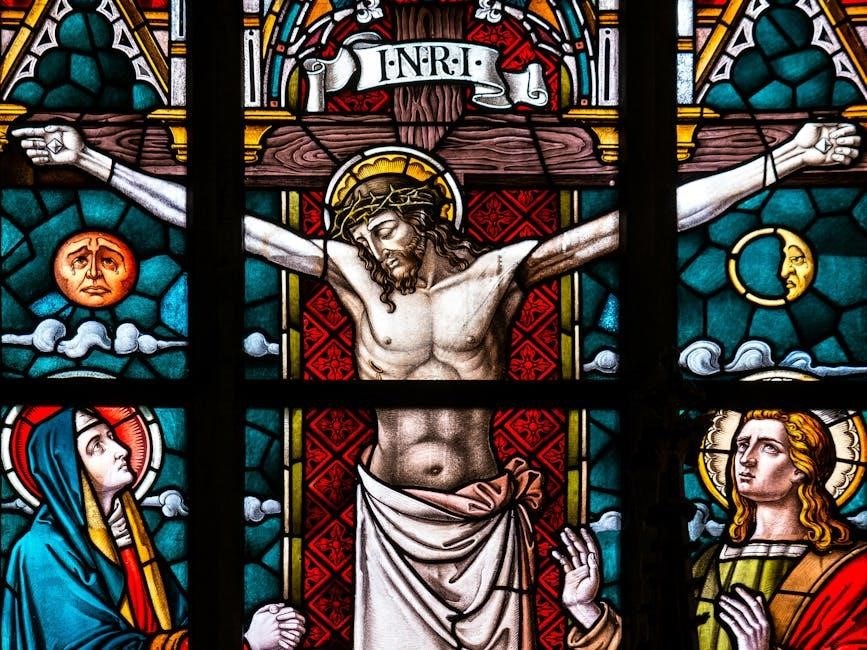Jesus fulfilled over 300 Old Testament prophecies, including details about His birth, ministry, death, and resurrection, confirming His Messiahship and demonstrating divine sovereignty․

Overview of the Topic
The fulfillment of Old Testament prophecies by Jesus Christ is a cornerstone of Christian theology, demonstrating His divine identity and mission․ These prophecies, made centuries before His birth, detail His lineage, birthplace, ministry, death, and resurrection․ Scholars estimate that Jesus fulfilled between 200 to 400 specific predictions, including His virgin birth, crucifixion, and resurrection․ The statistical improbability of these fulfillments highlights God’s sovereignty and confirms Jesus as the Messiah․ These prophecies, recorded in Scriptures, provide compelling evidence of Jesus’ role in God’s redemptive plan, strengthening faith and understanding of His divine purpose․
Importance of Studying Messianic Prophecies
Studying Messianic prophecies is essential for understanding Jesus’ divine identity and mission․ These prophecies, fulfilled with precision, confirm His role as the Messiah and reveal God’s sovereignty․ By examining these predictions, believers gain deeper insight into God’s redemptive plan, strengthening their faith and trust in Scripture․ The fulfillment of over 300 prophecies, including His virgin birth and resurrection, underscores the authenticity of Jesus’ mission․ This study not only enriches spiritual understanding but also provides compelling evidence of God’s foreknowledge and purpose, reinforcing the validity of the Gospel message․

The Number of Prophecies Fulfilled by Jesus
Jesus fulfilled over 300 Old Testament prophecies, with scholarly estimates ranging from 200 to 400, highlighting the statistical improbability and divine orchestration of His life․
Scholarly Estimates of Prophecies Fulfilled
Scholars estimate that Jesus fulfilled between 200 to 400 Old Testament prophecies․ J․ Barton Payne lists 191 specific prophecies, while others, like Peter Stoner, highlight over 300․ These estimates vary due to differing criteria for what constitutes a direct prophecy․ Regardless, the sheer number underscores the extraordinary nature of Jesus’ life and ministry․ Resources like Rose Publishing’s “100 Prophecies Fulfilled by Jesus” and H․L․ Willmington’s “Book of Bible Lists” provide detailed analyses, showcasing the breadth of scriptural fulfillment․ This statistical improbability further solidifies Jesus’ unique identity as the Messiah․
Statistical Improbability of Fulfillment
The statistical improbability of Jesus fulfilling even a fraction of the prophecies is staggering․ Peter Stoner calculated the chance of one person fulfilling just eight prophecies as 1 in 10^17, making it virtually impossible for any human to achieve deliberately or accidentally․ This mathematical certainty highlights the divine orchestration behind Jesus’ life and ministry․ Such improbability underscores the supernatural nature of these fulfillments, providing compelling evidence of Jesus’ unique identity as the Messiah and reinforcing the validity of biblical prophecy․ This statistical marvel strengthens faith and confirms the hand of God in human history․
Messianic prophecies are categorized into Jesus’ birth, ministry, death, and resurrection, each fulfilling specific Old Testament Scriptures that validate His divine mission and identity as the Messiah․ Old Testament prophecies detailed Jesus’ birth, including His virgin conception and Bethlehem birthplace․ Isaiah 7:14 foretold a virgin would bear a son, fulfilled in Matthew 1:23․ Micah 5:2 predicted Bethlehem as His birthplace, realized in Luke 2:4-7․ Genesis 3:15 introduced the Seed of a woman, fulfilled through His divine conception․ These prophecies, written centuries earlier, underscore God’s sovereignty and Jesus’ unique identity as the Messiah, providing a foundation for understanding His mission and divine nature․ Jesus’ ministry and death were foretold in detail through Old Testament prophecies․ Zechariah 9:9 predicted His triumphant entry into Jerusalem on a donkey, fulfilled in Matthew 21:5․ Psalm 118:22 prophesied His rejection by Israel, realized in Matthew 21:42-43․ Isaiah 53 described His suffering and crucifixion, while Psalm 22:16-18 foresaw His pierced hands and feet․ These prophecies, fulfilled in events like His crucifixion and being given vinegar (Psalm 69:21, John 19:28-30), confirm His divine plan and identity as the Messiah, showcasing God’s precise sovereignty over His life and mission․ Old Testament prophecies clearly foretold Jesus’ resurrection, a cornerstone of Christian faith․ Psalm 16:10 declared that God would not let His holy one see decay, fulfilled in Acts 2:31․ Isaiah 53:11 promised His justification after suffering, realized in His resurrection․ Hosea 6:2 hinted at His rising on the third day, while Jonah’s three days in the fish symbolized His burial and resurrection․ These prophecies, fulfilled in events like Mary discovering the empty tomb (John 20:1-18), confirm Jesus’ divine power over death and His role as humanity’s redeemer, fulfilling God’s plan of salvation․ Key prophecies, such as Jesus’ virgin birth (Isaiah 7:14), crucifixion (Psalm 22:16-18), and resurrection (Psalm 16:10), were miraculously fulfilled, confirming His divine identity and mission․ Isaiah 7:14 foretells the virgin birth of Jesus, a miraculous sign of God’s promise․ This prophecy was fulfilled in Matthew 1:23, where Jesus is called “Immanuel,” meaning “God with us․” The virgin birth, a unique and supernatural event, underscores Jesus’ divine nature and sets the stage for His sinless life and redemptive mission․ This fulfillment highlights God’s precise planning and sovereignty in the incarnation of Jesus Christ, serving as a cornerstone of Christian theology and a testament to His Messiahship․ Psalm 22:16-18 prophetically describes Jesus’ crucifixion, including the piercing of His hands and feet, a method of execution not practiced at the time of the prophecy․ This was fulfilled in Jesus’ crucifixion, as recorded in John 19:23-24 and Matthew 27:35․ The soldiers’ act of casting lots for His garments aligns with the prophecy, further confirming its fulfillment․ This precise detail underscores the divine plan and Jesus’ voluntary sacrifice for humanity․ The statistical improbability of such specific prophecies being fulfilled by chance highlights God’s sovereignty and validates Jesus’ Messiahship, serving as a cornerstone of Christian faith․ Psalm 16:10 foretells Jesus’ resurrection, stating, “You will not leave My soul in Sheol, nor will You allow Your Holy One to see corruption․” This prophecy was fulfilled when Jesus rose from the dead on the third day, as documented in Acts 2:31 and 13:35․ His resurrection confirmed His divine nature and victory over sin and death․ The exaltation referenced in the prophecy is seen in Jesus’ ascension to the right hand of God, where He intercedes for believers․ This fulfillment is a cornerstone of Christian hope, demonstrating God’s faithfulness and the ultimate triumph of His plan of redemption․ The fulfillments of Messianic prophecies confirm Jesus’ divine identity and validate His mission, demonstrating God’s sovereign plan and the reliability of Scripture․ This validation strengthens faith and reveals God’s redemptive purpose․ The fulfillment of Old Testament prophecies in Jesus’ life, death, and resurrection provides compelling evidence of His Messiahship․ These prophecies, written centuries before His birth, accurately predicted His virgin birth, crucifixion, and resurrection․ For example, Psalm 22:16-18 foretold His crucifixion, including the piercing of His hands and feet, while Psalm 16:10 prophesied His resurrection․ The statistical improbability of one person fulfilling even a fraction of these prophecies highlights the divine orchestration of His life․ This confirmation establishes Jesus as the promised Messiah, aligning with the expectations of the Jewish people and fulfilling God’s redemptive plan․ The fulfillment of Messianic prophecies in Jesus’ life demonstrates God’s sovereign control over history․ These prophecies, such as His birth in Bethlehem and crucifixion, were beyond human manipulation․ The intricate details, like soldiers gambling for His garments, highlight divine foresight․ The statistical improbability of these events occurring by chance underscores God’s master plan․ This fulfillment reveals His authority and purpose, confirming that Jesus’ life was part of a larger divine narrative, showcasing God’s power and precision in redeeming humanity through His Son․ Studying Jesus’ fulfilled prophecies strengthens believers’ faith and deepens their understanding of God’s redemptive plan, offering practical insights for trusting His sovereignty in their lives daily․ Studying the prophecies fulfilled by Jesus strengthens believers’ faith by revealing God’s precise plan and sovereignty․ Over 300 Old Testament prophecies, including His virgin birth, crucifixion, and resurrection, were fulfilled in Jesus’ life․ Scholars like J․ Barton Payne estimate at least 191 specific prophecies were personally fulfilled by Him․ The statistical improbability of these fulfillments, as noted by Peter Stoner, highlights divine orchestration․ This confirmation of Scripture’s accuracy deepens trust in God’s Word and reinforces Jesus’ identity as the Messiah, providing believers with a firm foundation for their faith and confidence in His divine mission․ Jesus’ fulfillment of Old Testament prophecies reveals God’s intricate plan of redemption, designed long before His birth․ From the promise of a Savior in Genesis to His resurrection, these prophecies outline God’s strategy to reconcile humanity․ The virgin birth, crucifixion, and resurrection were central to this plan, demonstrating God’s sovereignty and love․ By fulfilling these prophecies, Jesus confirmed His role as the Messiah, providing salvation and restoring humanity’s relationship with God․ This fulfillment underscores the consistency and perfection of God’s plan, offering believers hope and assurance of His promises․ Jesus fulfilled over 300 Old Testament prophecies, confirming His identity as the Messiah and validating God’s sovereign plan․ This divine fulfillment brings hope and assurance to believers․ The fulfillment of Messianic prophecies by Jesus Christ is a profound demonstration of divine sovereignty and authenticity․ Over 300 Old Testament prophecies, spanning His birth, ministry, death, and resurrection, were precisely fulfilled․ These include His virgin birth, crucifixion, and resurrection, as foretold in Scriptures like Isaiah 7:14 and Psalm 22:16-18․ The statistical improbability of these fulfillments highlights the supernatural nature of Jesus’ life and mission․ This comprehensive fulfillment confirms His identity as the Messiah and underscores God’s meticulous plan of redemption, offering believers assurance of His divine authority and the reliability of Scripture․ Studying the prophecies fulfilled by Jesus offers profound spiritual enrichment and deepens faith․ These prophecies, meticulously recorded in the Old Testament and fulfilled in Christ, reveal God’s sovereignty and the precision of His plan․ They serve as a testament to the reliability of Scripture and the authenticity of Jesus’ Messiahship․ Exploring these prophecies strengthens believers’ confidence in God’s Word and provides a deeper understanding of His redemptive plan․ By examining these fulfilled promises, Christians can gain inspiration, trust, and a renewed appreciation for the divine wisdom woven throughout history․
Key Categories of Messianic Prophecies
Prophecies Regarding Jesus’ Birth
Prophecies About Jesus’ Ministry and Death

Prophecies Concerning Jesus’ Resurrection

Significant Prophecies and Their Fulfillment
Born of a Virgin (Isaiah 7:14)
Crucifixion and Piercing (Psalm 22:16-18)
Resurrection and Exaltation (Psalm 16:10)

The Significance of These Fulfillments
Confirmation of Jesus’ Messiahship
Evidence of Divine Sovereignty


Practical Applications for Believers
Strengthening Faith Through Prophecy

Understanding God’s Plan of Redemption
Encouragement to Study Prophecies